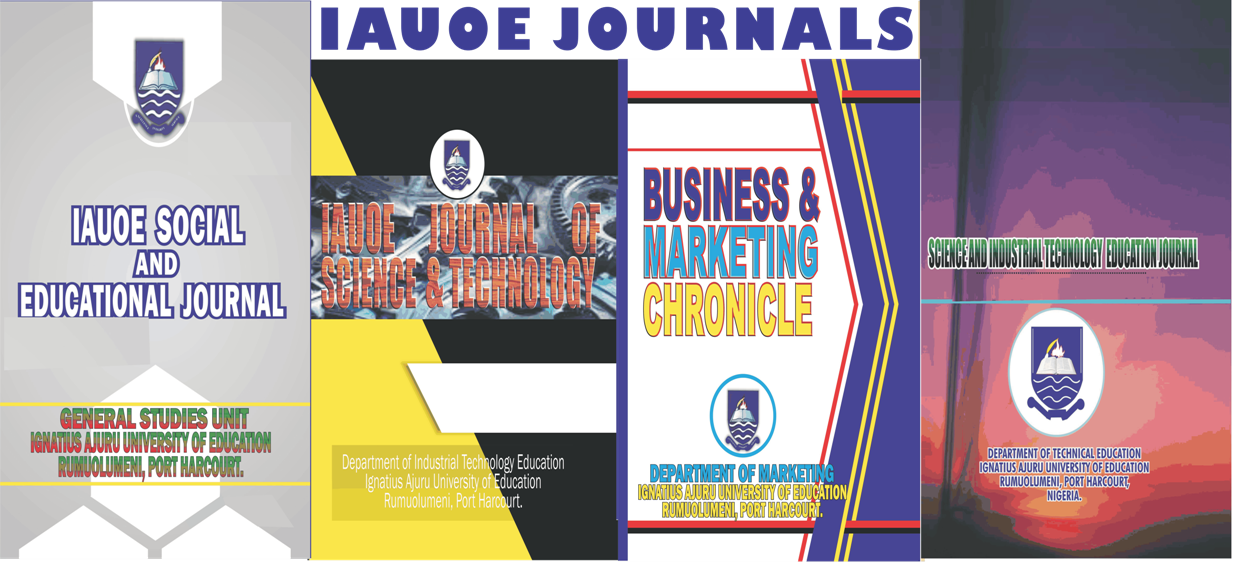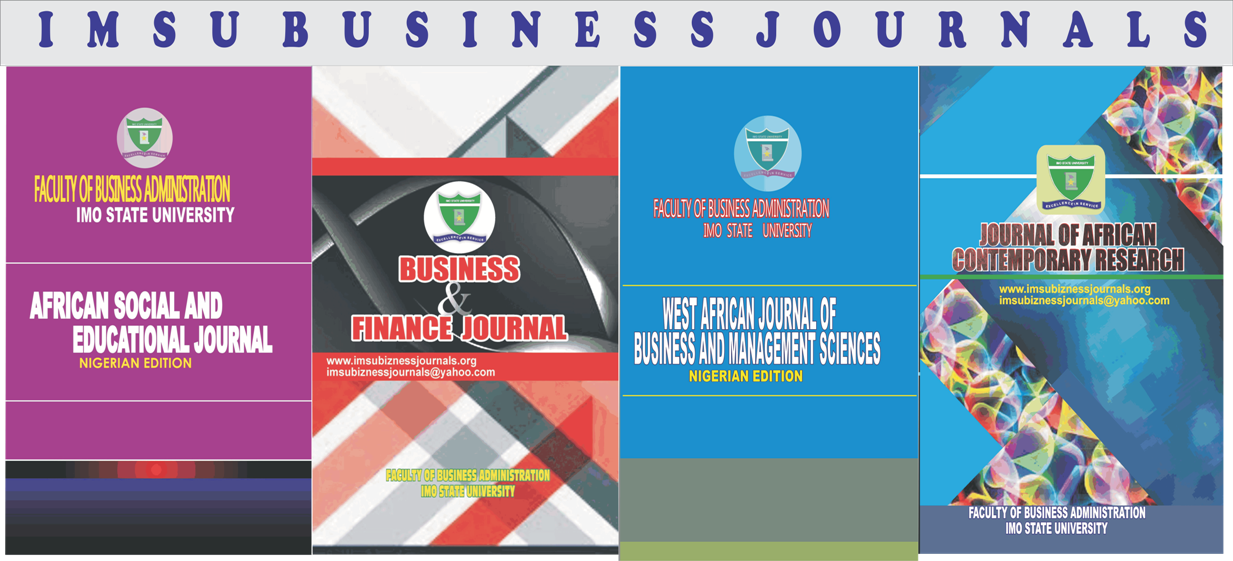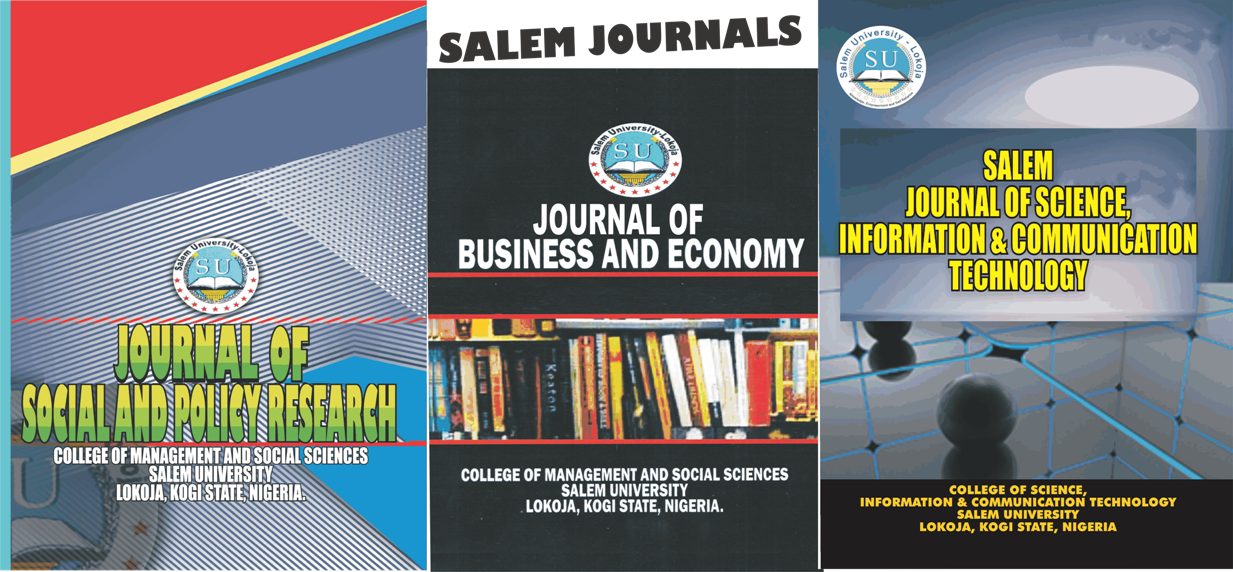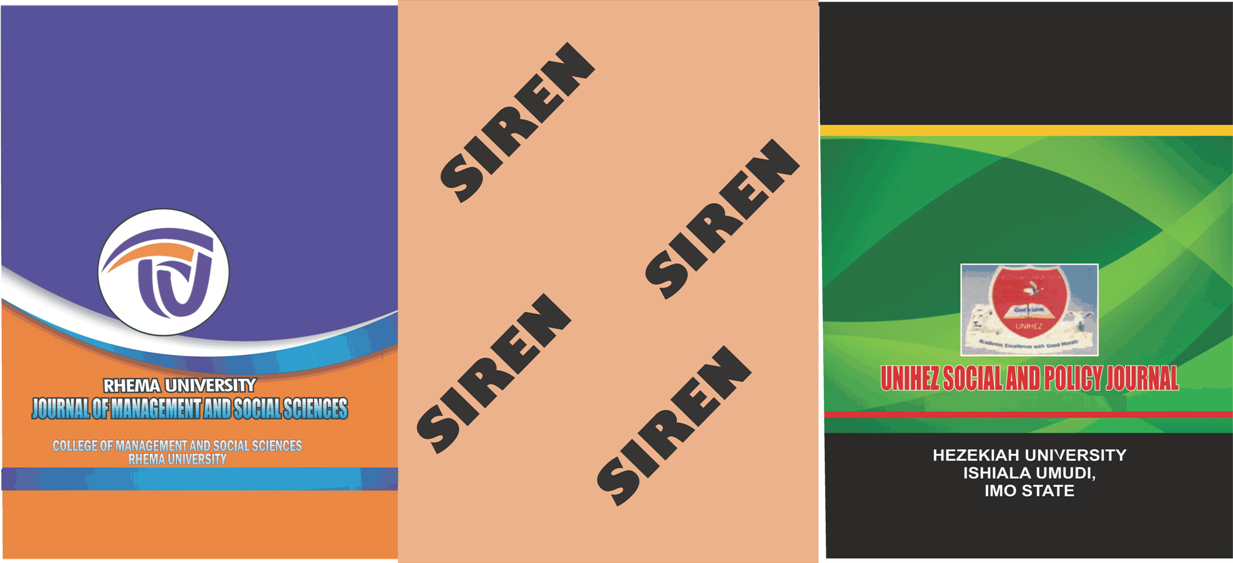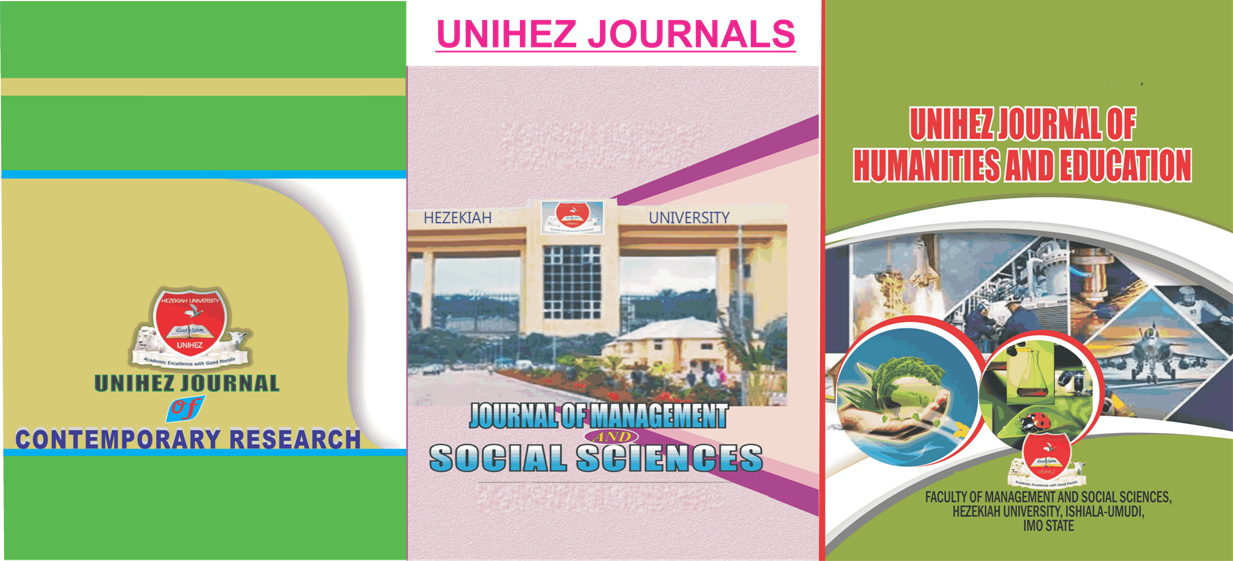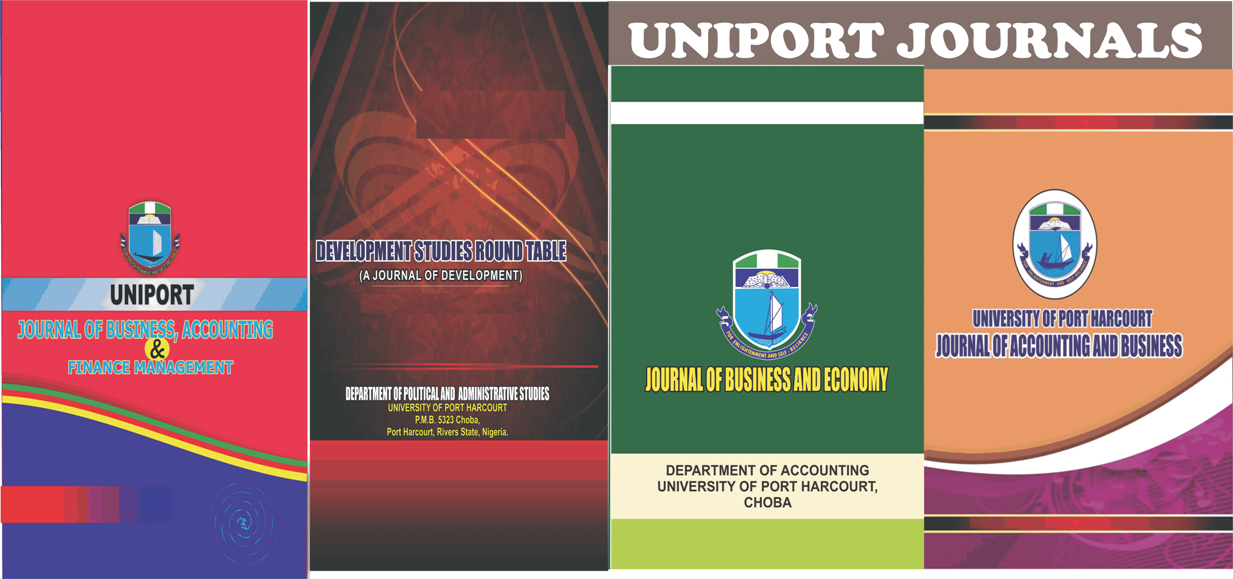2020 Archive
| 1 |
Title: ACCOUNTING AND SUSTAINABLE DEVELOPMENT IN EMERGING ECONOMIES THE NIGERIAN SCENARIO.pdf Author: Olopade David Oyeyemi, PhD. & Akubo Alewo Johnson, PhD. Abstract: Accounting for sustainability is the process of internalizing socio-economic factors, otherwise referred to as externalities to product costs, using any of the modeling techniques namely; eco- balance, life cycle analysis and ecological foot print. However, these costs are valued by pollution methods and cost of the damage arising from impacts to be internalized to increase product costs, reduce profits and ameliorate stakeholders’ adverse impacts. It also assist decision makers to take rational decisions based on full- cost and get economic prices right. Methods of arriving at environmental amount to be internalities is calculated and the value of externalities is deducted from profits available for distribution as dividends. It also showed a reduced profit and cash available for dividend and reduces stakeholder’s impacts’ costs borne by them. The results disclosed by present traditional accounting and socio-economic measurement information is unrealistic in achieving sustainable development, an aspect of development that targets meeting the needs of the present without compromising the ability of future generations to meet their own need. Based on the foregoing, this piece, using the stakeholders’ theoretical approach, advocates that Nigeria and other developing countries should shift accounting for sustainability to achieve the desired objectives, externalities data should be widely available, Academics and professionals should develop accounting for sustainability in line with developed countries. The concept should be widely promoted in developing countries and disseminated among organizations through rigorous education and training. Key word: - Accounting for sustainability, developing countries, externalities, internalities View |
| 2 |
Title: FLEXIBILITY IN ENTERPRISE SWITCHING AS RELATIVE PRICES CHANGE IN NIGERIAN AGRICULTURE.pdf Author: C.C. Molokwu, PhD. Abstract: The problem of the study is that in spite of mixed farming system that is dominant in Nigerian agriculture when analyzing farming activities in the country, attention is usually focused on the technical and economic efficiencies of separate enterprises (crops or livestock or fishery) in isolation, negligent of the fact that farmers operate the enterprises as a system, and make decisions concerning each enterprise with due consideration to the interrelationships that exist between various outputs (crops, livestock and fishery) and the various inputs involved in the system. The main objective of the study is to analyze mixing farming system of agriculture in Nigeria as a joint production of enterprises using the transcendental logarithmic (translog) variable profit function to generate the parameters of the relationships between the enterprises; and between the enterprises and inputs (fixed and variable); applying truly exogenous variables (prices) as the choice variables. The study covers the entire Nigerian agriculture but limited by the period 1981 to 2012 and the enterprises involved are: crops, livestock and fishery and the inputs used are: labour, working capital and land. This study specified the normalized transcendental logarithmic variable profit function; derived the system of output supply and input demand equations and estimated the system of equations using the Zellner (1962) Seemingly Unrelated Regressions (ZSUR) approach. The data used in the study is nationwide secondary time series data on values and index prices of crops, livestock and fishery contributions to the Gross Domestic Product (GDP) published in the Statistical Bulletin by the National Bureau of Statistics (NBS) from 1981 to 2012. The estimated trasnlog variable profit function satisfied the monotonicity requirement of non-decreasing in the prices of variable output and non-increasing in the prices of variable inputs. Based on the observed values of the coefficients of determination, the signs of the estimated coefficients and the t-values, it was concluded that prices substantially influence the supply of crops, livestock and fishery; and the demand for labour and working capital in Nigerian agriculture. It was evident from the study that as at 2012 crops and livestock; and crops and fishery enterprises had complementary relationships which implied that there was no switching from crops to livestock and vice versa or from crops to fishery and vice versa as the crops prices changed. However livestock and fishery had competitive relationship consequently, as the prices of the fishery increases farmers tend to switch from livestock to fishery and vice versa.The elastic price of agricultural labour is not unexpected because as more states are being created and many towns are being urbanized agricultural labour gets scarcer as other modern-sector enterprises compete for the available labour. The inelasticity of the price demand for working capital reflects the non-readily availability of the SGCF loan irrespective of the farmers willingness to pay back. The study recommended that government should stimulate increase production of crops, livestock and fishery by inducing increases in their selling prices. This could be achieved through price incentives to producers. Government should implement policies that will attract youths to the farm. This could be achieved by providing rural infrastructures, removal of drudgery in agricultural work and price incentives. Government, agricultural and commercial banks should provide soft loans for agricultural purposes. Key words: Analyze mixed farming system; transcendental logarithmic variable profit function View |
| 3 |
Title: EMPLOYEE JOB SATISFACTION A SURVEY OF SELECTED PUBLIC INSTITUTIONS IN EDO STATE NIGERIA.pdf Author: Smart Osarenmwinda, PhD. & Osarumwense Iguisi, PhD. Abstract: The aim of the study is to empirically examine the level of job satisfaction among employees in public organizations in Edo State, Nigeria. A descriptive survey method was adopted whereby questionnaire was developed to collect data from 486 employees of three public organizations in Edo State, Nigeria. Overall, a large portion of the staff surveyed lacked satisfaction in their job. In other words, there is no proper motivation. The findings show that most employees in the three organizations were dissatisfied with their job responsibilities, the work place culture, performance evaluation and job rewards benefits/ (salaries). However, the empirical findings show that employees were satisfied with the nature of supervision and administration, professional development and opportunities that are being offered to them. The study recommends that public organizations should fully implement the provisions of the Nigerian Labour Law as this will enhance job satisfaction among the employees. Keywords –Workplace Culture, Roles and Responsibility, Reward Performance Evaluation View |
| 4 |
Title: RELEVANCE OF MARKETING EDUCATION AND ECONOMIC GROWTH IN NIGERIA.pdf Author: Eluozo Collins & Harryba Braide Abstract: The relevance of marketing education and its inputs on the socioeconomic growth of Nigeria was examined. The paper considered the various meanings of education, people’s perception about education, what constitutes an educational system was also examined. The relationship between educational setting, school system and education was synthesized and analyzed. The basis of business education cum marketing, its role in human capacity building was addressed. The paper x-rayed the marketing strategies in Nigeria comparatively with that of other countries, issues hampering business growth in Nigeria was equally discussed. Possible ways of improving marketing structure in the agricultural sector, education, and economic sectors in Nigeria was fully addressed. The paper concluded with relevance of business education to the Nigerian citizens and recommendations on the areas of shortcomings were highlighted Keywords Business, Education, Nigeria, Igbo, Business Education, Trade, Manufacture, Technology, School, Skills, Production, Curriculum, Tourism, Marketing, Bloc, Export, Industry, Standards, Amplify. View |
| 5 |
Title: PERCEIVED PROCEDURAL FAIRNESS AND COMPLAINT SATISFACTION OF CUSTOMERS OF EATERIES IN PORT HARCOURT.pdf Author: Ateke, Brown Walter & Igwe Peace Abstract: This study investigated the association between perceived procedural fairness and complaint satisfaction of customers of eateries in Port Harcourt. The study assessed perceived procedural fairness in terms of complaining accessibility, prompt response and flexible procedures; while complaint satisfaction was treated unidimensionally. An explanatory research design was adopted; and a structured questionnaire served as the research instrument. The Spearman’s rank order correlation served as the test statistic, relying on SPSS version 20.0. The study observed that perceived procedural fairness relates positively and significantly with complaint satisfaction. The study thus concludes that repeat complaint satisfaction depends on complaining accessibility, prompt response and flexible procedures; and recommend that eateries in Port Harcourt that seek to ensure complaint satisfaction for their customers should make their complaint procedures accessible, respond to customers complaints rapidly and adapt their complaint handling procedures to suit the requirements of individual customers. Keywords: Complaining accessibility, complaint satisfaction, flexible procedures, perceived procedural fairness, prompt response. View |
| 6 |
Title: FIRM CHARACTERISTICS AND CORPORATE SOCIAL DONATIONS AMONG NIGERIAN FIRMS.pdf Author: Akhalumeh, Paul, PhD. & Ohiokha Friday Izien, PhD. Abstract: This study aims to evaluate the effect of firm characteristics on corporate generosity in areas of corporate social responsibility. The study employs ex post facto research design and data were obtained from the secondary source of annual reports and accounts for the period from 2012 to 2016 of the sampled firms. While measuring corporate generosity as corporate social donations, the firm characteristics (explanatory variables) were measured as firm size, firm financial performance (return on assets and return on equity) and ownership structure (defined as ownership concentration, management ownership, institutional block ownership and foreign ownership) The findings of the study include: firm size and foreign ownership have significant positive effect on corporate social donations; firm financial performance does not significantly affect corporate social donations significant positive effect on corporate social donations; ownership concentration, management ownership and institutional ownership have significant negative effect on corporate social donations. It is recommended that firms should provide their corporate social donations to reflect their size, firms should always ensure that they plough a commensurate proportion of their profits to take care of social and environmental obligations, and ownership structure of all types should always be mindful of social and environmental sustainability and hence be more committed to contributing to the sustainability cause. Keywords: Firm size, Financial performance, Ownership structure, Corporate donations View |
| 7 |
Title: JUST IN TIME INVENTORY MANAGEMENT AND MARKETING PERFORMANCE OF QUOTED FIRMS IN THE NIGERIAN MANUFACTURING INDUSTRY.pdf Author: Nwulu, Chinyere Stella & Opara Bright C. Abstract: This study investigated the relationship between just-in-time inventory management and market performance of manufacturing firms in Nigeria. The objectives of the paper were to ascertain the extent to which just-in-time inventory management impacts on marketing performance measures such as sales growth, and profitability. The study adopted a cross-sectional survey design and data is generated from 15 quoted manufacturing firms in Nigeria. The Spearman’s rank order correlation coefficient was adopted in ascertaining the relationship between just-in-time inventory management and marketing performance measures sales growth, and profitability; all hypotheses were rejected based on the evidence of significant associations between the variables. The findings showed that just-in-time inventory management significantly impacts on both sales’ growth and profitability; hence in conclusion the study asserted that the evidence of just-in-time inventory management facilitates improved marketing performance for manufacturing firms in Nigeria. Keywords: Just-in-time inventory management, marketing performance, profitability, sales growth. View |
| 8 |
Title: DIRECT TAX AND INCOME REDISTRIBUTION A REVIEW OF LITERATURE.pdf Author: Osariemen Mayowa Imonitie & Osasu Obaretin, PhD. Abstract: This study was motivated by the need to understand the relationship between direct tax and income redistribution in Nigeria. To achieve this objective, a library research design was employed to review relevant concepts, theories and literatures on direct taxes and income redistribution from the perspective of both developed nations and developing nations.It was concluded from the study that direct tax play a vital role in redistributing income in the economy, it was also observed that direct tax was still the main tax in term of contribution to total tax revenue in Nigeria and a key factor in income redistribution in economy. Premised on the conclusion the study recommends that an empirical study be carried out to test these assertions within the Nigerian context. Keywords: taxes, taxation, direct tax, Income redistribution. View |
| 9 |
Title: ACHIEVING QUALITY FINANCIAL REPORTING IN NIGERIA THROUGH COMPLIANCE WITH ACCOUNTING ETHICS.pdf Author: Ihe Ndubuisi John, PhD. & Emelogu, Lovinah C. Abstract: The study explored how quality financial reporting can be achieved through compliance with accounting ethics. The study applied a diagnostic approach. It maintained that ethics indicate a philosophical reflection on moral beliefs as well as practices; hence, ethics is a conscious stepping back which reflects on morality. Methodologically, the study applied survey. Design using a well-structured questionnaire to seventy five (75) staff of Starline Nigeria Limited, Aba; NED Consultants, Aba and Abia State Polytechnic, Aba. A total number of seventy five (75) cases (sample size) used were all questionnaire administered and collected. The reliability test of the questionnaire was tested using Cronbachs Alpha Model. The data was analyzed in tabular form and the hypotheses were tested using Multiple Regression Model which was run using Statistical Package for Social Sciences (SPSS) version 16.0. The significance value (sig value) was used for decision making and the results show that their respective significance values at 95% confidence interval are less than 0.5: thus, all the stated null hypotheses were rejected while the alternative hypotheses were accepted which states as follows: there is a positive significant relationship between compliance with accounting ethics and faithful presentation of financial reports, there is a positive significant relationship between compliance with accounting ethics and completeness of financial reports, there is a positive significant relationship between compliance with accounting ethics and reliability of financial reports, there is a positive significant relationship between compliance with accounting ethics and understandability of financial reports and there is a positive significant relationship between compliance with accounting ethics and comparability of financial reports. The results were corroborated by multiple regression values of 0.972, 0.718, 0.859, 0.972 and 0.709 which indicated a good level of prediction and R2 values of 0.944, 0.516, 0.738, 0.859 and 0.502 indicated that the independent variables statistically significantly explain the variability of the dependent variable. Based on the findings, the paper concluded that compliance with accounting ethics is very relevant and indispensable in achieving quality financial reporting and recommended among other things that companies should establish ethics and quality control department in order to enforce compliance to ethical codes of conduct, and accounting professional bodies should adequately monitor the members to ensure ethical compliance in order to produce quality financial reports and to avoid anything that will bring discredit to the profession Keywords: Quality Financial Reporting, Accounting Ethics, Nigeria. View |
| 10 |
Title: SOCIO-ECONOMIC IMPLICATIONS OF INDUSTRIAL UNREST IN NIGERIA A COINTEGRATION AND CAUSALITY TEST.pdf Author: Magaji Nanle, PhD., Maku Olukayode E., PhD. & Ajike Emmanuel O., PhD. Abstract: Nigeria has witnessed a plethora of trade disputes rather than peaceful industrial relations. The pattern of industrial relations has been conflictual with disruptive consequences and significant work-hour losses due to work stoppages. Thus, this study examines the socio-economic implications of industrial unrests in the Nigerian economy within a period of 24 years i.e. 1990-2013. It tests for unit root, cointegration, multiple regression estimation, post-estimation and causal relations among capital, work stoppage, workers involved, trade dispute, man-day lost and per-capita income. There exist a long-run relationship between industrial unrest factors and welfare measured by per-capita income. The Granger causality test result shows a bi-casual relation exists between capital and per capita income, as other industrial unrest factors were found to have no causal relation with welfarism in Nigeria. The results further revealed that capital, work stoppage and workers involved exert positive influence on socio-economic development measured by per capita income in Nigeria. Thus, trade dispute and man-day lost are found to exert negative effect on socio-economic development measured by per capita income. Moreover, government is to promptly review, negotiate and implement collective agreements entered with workers concerning improvements in wages and general working conditions. Keywords: Industrial unrest factors, per-capita income, cointegration test, Granger causality test, Nigeria. View |
| 11 |
Title: FORENSIC ACCOUNTANTS AND FRAUD CONTROL IN EMERGING ECONOMIES A CASE OF NIGERIA.pdf Author: Prof. Emma I. Okoye & Rosemary Edememem Uagbale -Ekatah Abstract: The study has attempted to examine a number of issues relating to forensic accounting and fraud control in emerging economies like Nigeria. The survey research design was employed with an extensive reliance on primary data drawn using questionnaires to examine a range of issues of interest to the study. This study investigated this issue using a sample of both accounting lectures and auditors and found that forensic accounting improves investigative auditing skills of accountants and can help in curbing financial crimes. There is also the consensus that curriculum training for accountants in Nigerian is largely deficient in forensic accounting skills and that the practice of forensic accounting appears still very theoretical in Nigeria. The survey refuted the view that diffusion of forensic accounting skills expertise appear more common for auditors in big 4 audit firms but confirmed that the legal and judicial system is well structured for prosecution of forensic evidence cases. The survey also shows that the regulation of forensic accountants separately from ICAN regulation will further the expertise of forensic practice in Nigeria and that practice of forensics accounting will improve investor’s confidence in the Nigerian business environment. The study recommends that for wide diffusion of forensic accounting expertise across accountants through a development of a thorough curriculum in this regard both for under-graduate and graduate student and continuing education programme for professional accountants and auditors by regulatory bodies such as the ICAN and ANAN. View |
| 12 |
Title: CUSTOMER INVOLVEMENT SERVICES AND CUSTOMERS SATISFACTION OF HOTELS IN PORT HARCOURT.pdf Author: D. G. Ademe, PhD. Abstract: The study examined the influence of quality service of customer involvement of hotels on customer satisfaction. As hospitality based study, data were generated from 100 customers of all the 10 registered and quoted hotels operating in Port Harcourt, Rivers State, at a ratio of 10 customers’s per. hotels using a questionnaire. The generated data were analyzed using spearman ranked correlation coefficient statistical tool. Result showed that all the dimensions of customer involvement services used in the study has a positive influence on customer’s satisfaction. However, customer loyalty was found to be the most influential. In view of the findings, the hotels were advised to ensure that customers’ satisfaction is the bed rock of upgrading existing and or installing new customer’s involvement services platforms as well as creating adequate awareness about these involvements. Key words: customer’s satisfaction, hotel industry, customer loyalty, customer’s patronage, brand loyalty, and word-of-mouth. View |
| 13 |
Title: COMMUNICATION AND EMPLOYEE PERFORMANCE IN FIRST BANK PLC NIGERIA.pdf Author: Onikoyi Idris Adegboyega, PhD. & Ajayi, Ezekiel Oluwole, PhD. Abstract: This study was designed on the topic Effect of Communication in Improving Employee Performance in First Bank Plc, Nigeria". This research adopted a survey research designs. Hypothesis one which stated that there is no significant relationship between effective communication and employee’s performance was rejected. The result from correlation analysis revealed that effective communication has positive relationship with employees’ performance. The variables were statistically significant at 95% and 99% confident limit. The regression analysis result revealed that lines of communication variables significantly predicted the level of employee performance. F (1, 92) = 1.895, p > 0.05. F – Statistics indicates that the overall regression model is highly significant in terms of its goodness of fit. Therefore, null hypothesis was rejected. Hypothesis two testing revealed that the variables measured Employee Performance has positive relationship with Communication Skill. The variables were statistically significant at 99% confident limit and sig 0.000. The result was statistically significant at sig = 0.01. Null hypothesis was rejected. Based on the findings of this research, the following recommendations are being put forward: Organization should make available communication tools for their employees in improving their performance and delivering their duties which will help them to get different information’s about the next strategy that needed to embark on in order to maximize the Organization aims and objective, it will also reduce the level of stress and uninformed about their duties in the course of their job. This will help them to be more committed with their job and be more focused towards the achievement of overall Organizational objectives. Keywords: Communication, Employee Performance, Organization, Communication Process: View |
| 14 |
Title: INDUSTRIAL RELATIONS IN A THIRD WORLD SETTING ANALYSIS OF DUNLOPIAN APPROACH.pdf Author: John Mark, PhD. Abstract: The emergence of industrial relations in Nigeria probably began with colonial administration. Ever since then the practice of the trade among union members, has borne with it the foot print of the imperial masters. What then this implies is that there is yet a sort of neo-colonialism in our practice of labour. The paper then posits that industrial harmony, if ever will be witnessed, must strip itself of every form of imperial practice. There is need union members take cognizance of regional differences; such as the peculiarity of our culture climate; environmental needs; and above all; our humanity as a people. Five union leaders were interviewed to this regard, and with the use of likert’s scaling approach, the conclusion of the paper is that the major challenge to our practice of industrial relations in a third world setting is the adoption touch of traditional approach against regional difference. The paper hinges its position on dunlops system approach. Key words: Industrial relations; third world setting, Dunlopian approach View |
| 15 |
Title: CAPITAL STRUCTURE AND FIRM’S VALUE OF LISTED DEPOSIT MONEY BANKS IN NIGERIA.pdf Author: Akpomudje O. G., Edokpayi S. A. & Onyeachom O. F. Abstract: This study evaluate the effect of capital structure on firm’s value of listed Deposit Money Banks in Nigeria over the period of 2011 to 2015. The study employs secondary data as evaluated using; descriptive statistics, correlation matrix and the panel regression as captured by the Hausaman test of Random Effect coupled with various diagnostic tests such as the Varaiance nflation Factor test, Heteroskedasticity test, Breusch and Pagan Lagrangian multiplier test for random effects. The study finds that capital structure variable proxy by ratio of total debt to equity has negative and significant impact of the value of listed deposit money banks in Nigeria given the p-value less that 5% level of significance. The findings of this study is in conformity with some previous findings by difference scholars. The findings also this study also confirm capital structure relevant theories (traditional approach). The study confirms that the traditional capital structure theory is valid. It reaffirms that leverage in both the highly and lowly geared firms is statistically significant and is an important determinants of the value of the listed deposit money banks in Nigeria. In line with our finding, we strongly recommend that firms (both highly and lowly geared) should take into cognizance the amount of leverage incurred because it is a major determinant of firm’s value, this is obvious in both the highly geared and lowly geared firms. Also, firms should use more of equity than long-term debt in financing their business activities, in as much as the value of a business can be enhanced using debt capital, it gets to a point that it becomes detrimental to the value of the business, hence firms should establish the point at which the weighted average cost of capital is minimal and maintain that gearing ratio so that the company’s value will not be eroded, as the firm’s capital structure is optimal at this point ceteris paribus. This is because the highly geared firms are more prone to lower firm performance as a result of an additional leverage incurred. Keywords: Capital Structure, Firm’s Value, Deposit Money Banks. View |
| 16 |
Title: ANALYSIS OF REVENUE AND ECONOMIC PERFORMANCE AN EMPIRICAL STUDY OF NIGERIA GOVERNMENT SCORECARD FROM 1981 to 2016.pdf Author: Ogbonna G.N. PhD., Friday Ojeaburu & Chibuzo Stella O. PhD. Abstract: Analysis of revenue and economic performance of Nigeria government was examined in this article in order to present Government Scorecard from 1981 to 2016. The relevant data was collected from secondary sources through Central Bank of Nigeria, and Pearson Product Moment correlation Coefficient (PPMCC) which measures the linear correlation between two variables X and Y and is denoted by r, was used to test the relationship between two quantitative values, namely: proxies of oil revenue and that of economic performance of Nigeria. In view of the hypotheses tested, the study found, among others, that oil revenue does not significantly influence GDP, per capita income and inflation. As a result of these findings, this study concludes as follows: that oil revenue money is not significantly and adequately being spent in the best interest of Nigerians in such an extent that will influence GDP, per capita income, and inflation rate; that oil revenue benefits few highly placed individuals who are connected to the power that be to the exclusion of the majority of Nigerians. Also, for the past decade, petroleum industry has been the main source of energy and contributed on average more than 74% while non-oil realized 26% to the Nigerian Federal Government finances. Based on these findings and conclusion, this paper recommends that government should invest more oil revenue in projects and infrastructures that will generate multiplier effects and impact positively on GDP, per capita income and inflation. Government should fight corruption more decisively and totally irrespective of whose ox is gored. They should diversify the economy into agriculture and encourage entrepreneurs to produce more goods and render more services in order to increase GDP and economic development. Key Words: Oil Revenue, Gross Domestic Product (GDP), per capita income, Poverty Index View |
| 17 |
Title: THE IMPACT OF MACRO ECONOMIC FUNDAMENTALS ON PROFITABILITY OF SMALL AND MEDIUM SCALE ENTERPRISES (SMES) IN A RECESSED ECONOMY.pdf Author: Ezenwuba Paul, PhD., Onyetube Ezenwuba Aghata N. & Ezenwuba Cecilia Uchenna Abstract: This study investigates the influence of macro-economic fundamentals on Small and Medium Scale Enterprises (SMEs) during the era of economic recession in Nigeria. The study employed secondary data obtained from annual statistical bulletin together with primary data retrieved from a well-structured questionnaires to owners/managers, Senior Staff and Junior Staff of fifteen (15) selected SMEs in Benin City, Edo State of Nigeria. The ordinary least square regression technique was employed to analyze the data set. The results revealed that the impact of inflation and exchange rate on SMEs profitability was negative and significant during economic recession in Nigeria. However, government policies was also seen to show a statistical negative impact on profitability of small and medium scale enterprises during the period under investigation. Based on the findings obtained from the empirical analysis, we carefully recommend there must be increased efforts from the government and other related agencies to assist in diversifying the revenue sources of small and medium scale enterprises. There is need for related authorities to provide contractionary fiscal or monetary policies that will combat inflationary pressure, with precautionary measures that will equally curb unemployment. Keywords: Economic Recession, Government Policy, Inflation Rate, Interest Rate Hike, SMEs. View |
| 18 |
Title: THE EFFICIENT MARKET HYPOTHESIS (EMH) THEORY AND EVIDENCE IN NIGERIA.pdf Author: Ajayi John Ayodele, PhD. & Jegede C.A., PhD. Abstract: This paper examines the Efficient Market Hypothesis in Nigeria. The paper is descriptive in nature. It describes the forms of market efficiency and highlights the various factors that have militated against market efficiency in Nigeria. The paper opines that for Nigerian capital market to be efficient some of the factors enumerated in this paper need to be taken into consideration. View |
| 19 |
Title: AN EXAMINATION OF THE PERFORMANCE OF BANKS IN NIGERIA A STOCHASTIC DOMINANCE APPROACH.pdf Author: Victor Amadin Idehen, PhD. & Prof. Peter O. Eriki Abstract: This study examined the performance of banks in Nigeria using stochastic dominance approach. Using some selected quoted banks in the Nigerian Stock Exchange, secondary data from the selected banks’ published annual reports, as well as various publications of the Nigeria Stock Exchange over the period 2000 – 2012 were used. The variables used for analysis were: capital adequacy, asset quality, management (efficiency), earnings, liquidity, sensitivity to market risk, dividend payment and credit loan. The technique adopted in this study is the stochastic dominance model to analyze the data, using model risk computer software package which provides a function Vose Dominance that produces a matrix of first and second order stochastic dominance test results for a set of generated outputs. The study utilized fifteen (15) selected banks and eight (8) variables. The result revealed that capital adequacy, asset quality, management (efficiency), earnings, liquidity, sensitivity to market risk, dividend payment and credit loan can be used as bank performance measures and invariably used in the rating of banks. The result also revealed that GT Bank dominates other banks selected for this study. This implies that GT Bank can be seen as the leading bank in Nigeria. The result of this study has established the fact that the most dominant bank becomes the leading bank. The result also showed that stochastic dominance model is a more advanced and sophisticated model that can be adopted by Central Bank of Nigeria in the rating of banks. Keywords: Stochastic dominance, bank performance, performance indicators View |
| 20 |
Title: DIVIDEND POLICY AN SHARE PRICES OF COMMERCIAL BANKS IN NIGERIA A PANEL DATA ANALYSIS.pdf Author: Mojekwu Ogechukwu Rita & Odi Ebi R. Abstract: The focal point of this study is to ascertain whether the value of a share is directly linked to the dividend policy of the firm. A total of 15 quoted banks were chosen for the period 2000 to 2015. The data estimation is based on cross-sectional Ordinary Least Square regression analysis to find the nexus between share price and the dividend policy measures: dividend yield and dividend payout ratio. The study used share market price as the dependent variable whereas dividend pay-out ratio and dividend yield are the explanatory variables. The study results reveal that noteworthy positive relationship exists between share price and the two key dividend policy measures: dividend yield and dividend payout ratio. Consequently, the study recommends that since the banking sector has a high-payout clientele who value dividend paying shares more than non-dividend paying shares, corporate managers should pursue generous dividend policy that maximizes shareholder’s value considering the effect of such strategic decision on the bank’s shares. Keywords: dividend policy, dividend yield, share market price, dividend pay-out ratio, shareholders’ wealth maximization View |
| 21 |
Title: DETERMINANTS OF MARKET VALUE OF QUOTED FIRMS IN NIGERIA A STUDY OF SELECTED DEPOSIT MONEY BANKS.pdf Author: Akobundu, Echewobo C., Ifionu, Ebele P. PhD. & Nnamdi, Ikechukwu S., PhD. Abstract: This study examined internal and external factors that determine market value of Nigeria commercial banks. Cross sectional data was sourced from financial statements of fifteen quoted commercial banks and Central Bank of Nigeria Statistical bulletin. Market value was proxy for dependent variables, internal variables were proxy by profitability, retained earnings, tax, risk, corporate governance, debt equity ratio, dividend payout ratio, company size and cost of capital while external variables were proxy by inflation rate, exchange rate, openness of the economy, regulation, real gross domestic product and real interest rate. After cross examination of the validity of the pooled effect, fixed effect and the random effect, the study accepts the fixed effect model. Results from the internal variable found that profitability, risk, debt equity ratio, company size and cost of capital have negative relationship with market value while retained earnings, tax, corporate governance and dividend payout ratio have positive relationship with market value of commercial banks while results that all the independent variables except inflation rate have negative but insignificant impact on the market value of the quoted commercial banks. The stationary test found that the variables are stationary at first difference while granger causality test found unidirectional and bidirectional causality among the variables. The study recommends that Management should formulate strategic and tactical measures to manage risks that affect the market value of the firms and optimal liquidity management policy that balance liquidity and corporate investment should be formulated. There is need for management to ensure optimal capital structure. Corporate governance codes should be complied by Management and retention funds should be well invested to maximize market value. Keywords: Market Value, Debt, Equity, Commercial Banks View |
| 22 |
Title: ORGANIZATIONAL DIVERSITY AND EMPLOYEE PERFORMANCE (A STUDY OF SELECTED ORGANIZATIONS IN PORT HARCOURT).pdf Author: Udokwu Ethel - Rose B., PhD. & Ani Anthony Ejike Abstract: This study was carried out to determine the effect of organizational diversity on employee performance. Cultural differences, ethnicity, social status, employee productivity and commitment were the basic variables of the study, from which the specific objectives were derived. Survey design was adopted in the methodology, in which 320 respondents were sampled from twenty-five organizations in Port-Harcourt, Nigeria. Simple random sampling was used to draw the three hundred and twenty samples while judgmental technique was used to select the twenty-five business organizations, based on their possession of some desired characteristics such as diverse workforce, large organization size, and accessibility. Questionnaire was the sampling instrument. The primary data were analyzed using the version 20 of the SPSS for regression and analysis of variance. The regression result showed that the beta coefficients (β0=0.348, β1=1.000, β2=0.629, β3=1.086 and β4=3.212) were statistically significant, leading to the rejection of the research hypotheses that suggested a null relationship. The regression result was confirmed by the Analysis of Variance which yield a highly significant Fischer’s ratio of F=11.632. It was thus concluded that organizational diversity has significant positive effect on employee performance. Keywords: Organizational diversity, employee performance, productivity, Commitment, social status, cultural differences, ethnicity. View |
| 23 |
Title: The Relationship between Capital Structure and Profitability of the Limited Liability Companies in Nigeria..pdf Author: Ajagbe T.S. (PhD), Mustapha A., Anjorin S.Y., & Jimoh S.A., Abstract: Abstract The decision on capital structure is the fundamental one that the profitability of an enterprise is directly affected by such decision. No doubt, proper care and attention is ensuring while determining capital structure decision because of the fact that the successful selection and use of capital depends on the firms’ financial strategy. The aim of this paper is to investigate the relationship between capital structure and profitability of the limited liability companies from an agricultural sector in the Nigeria over the past ten year period from 2010 to 2019. Data was obtained and processed from the database of Nigerian stock exchange fact books and annual report of the companies selected and was analyzed by using descriptive statistics, i.e. mean, median, standard deviation, coefficient of variation, Jarque-Bera, Durbin-Watson, and correlation analysis to find out the association between the two variables. The results of this paper show that the capital structure has positive and noteworthy impact on firm’s profitability. However, it was recommended that the managers of funds should carefully and adequately source for the capital needed for the companies so as to meet the interest of the various finance providers. Keywords: Capital structure, equity, debt, finance and profitability View |
